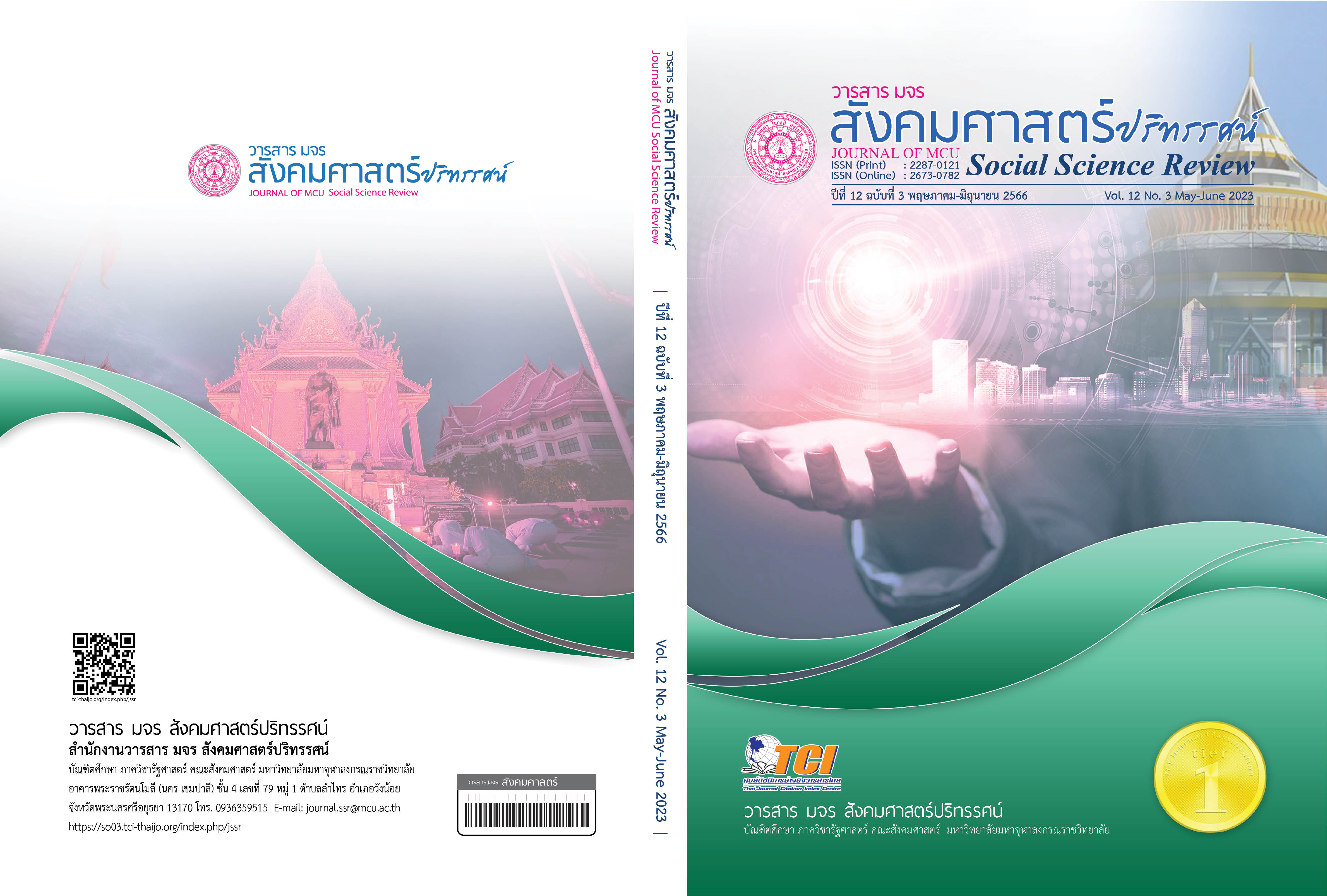พุทธวิธีการบริหารจัดการองค์กรคุณภาพของบริษัทมหาชน จำกัด
คำสำคัญ:
พุทธวิธีการบริหารจัดการ, องค์กรคุณภาพ, พละ 4บทคัดย่อ
บทความวิจัยนี้มีวัตถุประสงค์เพื่อศึกษาพุทธวิธีการบริหารจัดการองค์กรคุณภาพของบริษัทมหาชน จำกัด เพื่อศึกษาปัจจัยที่ส่งผลต่อการบริหารจัดการองค์กรคุณภาพของบริษัทมหาชน จำกัด และเพื่อนำเสนอรูปแบบพุทธวิธีการบริหารจัดการองค์กรคุณภาพของบริษัทมหาชน จำกัด เป็นการวิจัยแบบผสานวิธีเก็บข้อมูลกลุ่มตัวอย่าง จำนวน 390 ตัวอย่าง โดยใช้แบบสอบถามเป็นเครื่องมือ วิเคราะห์ข้อมูลเชิงพรรณนาและเชิงอนุมานด้วยโปรแกรมสำเร็จรูปทางสถิติ และการวิจัยเชิงคุณภาพใช้วิธีการสัมภาษณ์เชิงลึกจากผู้ให้ข้อมูลสำคัญจำนวน 18 รูปหรือคน โดยใช้การวิเคราะห์เนื้อหาเชิงพรรณนา
ผลการศึกษาพบว่า 1. การปฏิบัติตามหลักพุทธวิธีการบริหารโดยภาพรวมอยู่ในระดับมาก เมื่อเรียงลำดับตามค่าเฉลี่ยได้แก่ พุทธวิธีในการวางแผน พุทธวิธีการจัดองค์กร พุทธวิธีในการอำนวยการ พุทธวิธีในการกำกับดูแล และพุทธวิธีในการบริหารงานบุคคล ตามลำดับ 2. ปัจจัยที่ส่งผลต่อการบริหารจัดการองค์กรคุณภาพของบริษัทมหาชน จำกัด พบว่า พุทธวิธีการบริหาร และการบริหารงานตามหลักพละ 4 มีอิทธิพลต่อการบริหารจัดการองค์กรคุณภาพของบริษัทมหาชน จำกัด อย่างมีนัยสำคัญทางสถิติที่ระดับ 0.01 .3. รูปแบบพุทธวิธีการบริหารจัดการองค์กรคุณภาพของบริษัทมหาชน จำกัด คือ มีการบริหารจัดการองค์กรคุณภาพของบริษัทมหาชน จำกัด 3 ด้าน และมีปัจจัยที่ช่วยให้เกิดการบริหารจัดการองค์กรคุณภาพคือ พุทธวิธีการบริหาร และการบริหารงานตามหลักพละ 4
เอกสารอ้างอิง
ฐิติทัตน์ นิพนธ์พิทยา. (2562). รูปแบบการพัฒนาทรัพยากรมนุษย์ในยุคไทยแลนด์ 4.0 ของหน่วยบัญชาการทหารพัฒนา กองบัญชาการกองทัพไทย (วิทยานิพนธ์ปริญญาปรัชญาดุษฎีบัณฑิต สาขาวิชารัฐประศาสนศาสตร์). พระนครศรีอยุธยา: มหาวิทยาลัยมหาจุฬาลงกรณราชวิทยาลัย.
ธงชัย คล้ายแสง. (2562). การพัฒนาการท่องเที่ยวเชิงกีฬาโดยการบูรณาการหลักพุทธธรรมของจังหวัดบุรีรัมย์. (วิทยานิพนธ์ปริญญาปรัชญาดุษฎีบัณฑิต (รัฐประศาสนศาสตร์). พระนครศรีอยุธยา: มหาวิทยาลัยมหาจุฬาลงกรณราชวิทยาลัย.
ณภัทร ปิณฑรัตน์. (2555) คุณลักษณะของผู้นำองค์กรตามหลักพละ 4 ในธุรกิจประกันภัย (รายงานวิจัย) พระนครศรีอยุธยา: มหาวิทยาลัยมหาจุฬาลงกรณราชวิทยาลัย.
บมจ. อิตาเลียนไทย ดีเวล๊อปเมนต์. (2562). ปัจจัยความเสี่ยง. กรุงเทพฯ: เอกสารเผยแพร่.
_______. (2562). แบบแสดงรายการประจำปี. กรุงเทพฯ: เอกสารเผยแพร่.
_______. (2564). ข้อมูลบริษัท. สืบค้น 4 มกราคม 2564. จาก www.itd.co.th/th/about-itd.php
พระธรรมโกศาจารย์ (ประยูร ธมฺมจิตฺโต). (2549). พุทธวิธีในการบริหาร (พิมพ์ครั้งที่ 4). กรุงเทพฯ: มหาจุฬาลงกรณราชวิทยาลัย.
พระมหาศรีอรุณ คำโท. (2559). พุทธวิธีทางการบริหารสำหรับองค์กรภาครัฐสมัยใหม่. วารสารวิจัยเพื่อพัฒนาสังคมและชุมชน มหาวิทยาลัยราชภัฏมหาสารคา, 3(3), 1-10.
พัทธนัญพร พิพิธวรโภคิน. (2564). การบูรณาการหลักพุทธธรรมเพื่อเพิ่มผลิตภาพในการปฏิบัติราชการของบุคลากรองค์กรปกครองส่วนท้องถิ่น จังหวัดปทุมธานี (วิทยานิพนธ์ปริญญาปรัชญาดุษฎีบัณฑิต สาขาวิชารัฐประศาสนศาสตร์). พระนครศรีอยุธยา: มหาวิทยาลัยมหาจุฬาลงกรณราชวิทยาลัย.
ภูษิต วิเศษคามินทร์. (2563). ประสิทธิผลการนำนโยบายการแก้ปัญหาจราจรไปปฏิบัติของกองบังคับการตำรวจจราจร (วิทยานิพนธ์ปริญญาปรัชญาดุษฎีบัณฑิต สาขาวิชารัฐประศาสนศาสตร์). พระนครศรีอยุธยา: มหาวิทยาลัยมหาจุฬาลงกรณราชวิทยาลัย.
วีรณัฐ โรจนประภา. (2559). การนำหลักพุทธธรรมมาประยุกต์ใช้ในการสร้างสังคมแห่งสัมมาปัญญาใน ประเทศไทย. วารสารวิชาการ บัณฑิตวิทยาลัยสวนดุสิต, 12(3), 217-231.
Yamane, T. (1973). Statistic: An Introductory Analysis. New York: Harper & Row.
ดาวน์โหลด
เผยแพร่แล้ว
รูปแบบการอ้างอิง
ฉบับ
ประเภทบทความ
สัญญาอนุญาต
ลิขสิทธิ์ (c) 2023 วารสาร มจร สังคมศาสตร์ปริทรรศน์

อนุญาตภายใต้เงื่อนไข Creative Commons Attribution-NonCommercial-NoDerivatives 4.0 International License.
เพื่อให้เป็นไปตามกฎหมายลิขสิทธิ์ ผู้นิพนธ์ทุกท่านต้องลงลายมือชื่อในแบบฟอร์มใบมอบลิขสิทธิ์บทความให้แก่วารสารฯ พร้อมกับบทความต้นฉบับที่ได้แก้ไขครั้งสุดท้าย นอกจากนี้ ผู้นิพนธ์ทุกท่านต้องยืนยันว่าบทความต้นฉบับที่ส่งมาตีพิมพ์นั้น ได้ส่งมาตีพิมพ์เฉพาะในวารสาร มจร สังคมศาสตร์ปริทรรศน์ เพียงแห่งเดียวเท่านั้น หากมีการใช้ภาพหรือตารางหรือเนื้อหาอื่นๆ ของผู้นิพนธ์อื่นที่ปรากฏในสิ่งตีพิมพ์อื่นมาแล้ว ผู้นิพนธ์ต้องขออนุญาตเจ้าของลิขสิทธิ์ก่อน พร้อมทั้งแสดงหนังสือที่ได้รับการยินยอมต่อบรรณาธิการ ก่อนที่บทความจะได้รับการตีพิมพ์ หากไม่เป็นไปตามข้อกำหนดเบื้องต้น ทางวารสารจะถอดบทความของท่านออกโดยไม่มีข้อยกเว้นใดๆ ทั้งสิ้น





